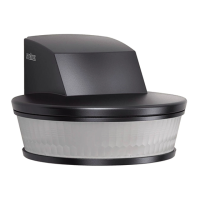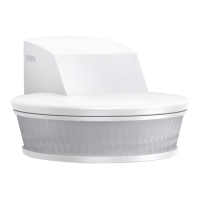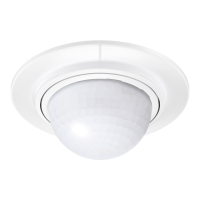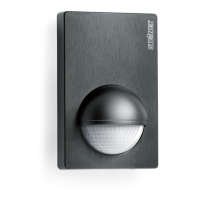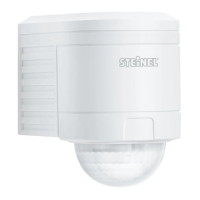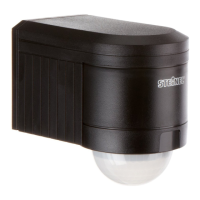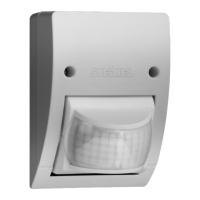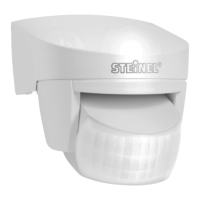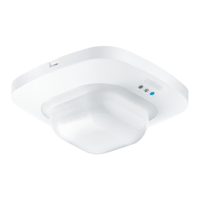- 20 - - 21 -
GB
Connection examples (Fig. E)
D
Danger
Danger to life from electric shock!
All work at the connections may only be
performed by a qualified electrician.
Connecting lights
► Connect lights that do not have a
neutral conductor as shown in con-
nection example 1.
► Connect lights that do have a neutral
conductor as shown in connection
example 2.
Installing two-circuit switch
If you want to switch OFF all connected
lights via switch:
► install a two-circuit switch for manual
and automatic operation (connection
example 3).
Installing two-way switch
If you want to switch ON and OFF
manually and also use sensor mode
(automatic):
► Install a two-way switch (connection
example 4).
Two-way switch options:
• Position I Sensor mode (switching
ON and OFF automatically)
• Position II manual operating mode:
switching ON and OFF via switch;
after switching OFF, sensor mode is
reactivated
Activating and deactivating manual
override
A two-way switch provides a manual
override function for lights connected.
To activate manual override:
► Turn the light switch to the OFF and
ON positions twice in rapid succes-
sion (within less than half a second).
Manual override keeps light ON per-
manently for four hours and then re-
turns to sensor mode.
To deactivate manual override:
► Turn the light switch to the OFF and
ON position once in rapid succession
(within less than half a second). The
light immediately switches to sensor
mode.
Settings (Fig. F)
During installation or at a later time, you
can infinitely adjust the stay-ON time
and the response threshold via the con-
trol dials.
► Using a screwdriver, turn the control
dials to the chosen positions:
Stay-ON time
+ maximum: 15minutes
– minimum: 5seconds
If you have set a stay-ON time of
15minutes, the sensor will switch
OFF the connected lights after
15minutes.
If the sensor detects further move-
ment, the stay-ON time will start from
the beginning again.
Using the response threshold, you can
infinitely adjust the level of ambient light
at which the sensor switches on the
lights connected.
Response threshold
+ maximum: 1000 lux
Daylight mode: the sensor
switches light ON in day-
light when it identifies a
movement.
– minimum: 2 lux
Twilight setting: the sensor
switches light ON at twi-
light. If the ambient bright-
ness is brighter than 2lux,
the sensor does not
switch light ON.
Detection zone (Fig. G)
Is the sensor switching light ON too
often because it is being triggered by
objects in the detection zone (e.g. in
response to passing vehicles)?
You can mask the sensor with shrouds
(8) to restrict the detection zone.
► Detach the cover ring and the
shrouds.
► Using a pair of scissors, cut the
shrouds to size horizontally and/or
vertically.
► Fit the shrouds to the sensor and, if
necessary, adjust them to the appro-
priate position.
► Re-fit the cover ring.
Operation
Perform function test
► Set the response threshold to the cur-
rent ambient brightness. The factory
setting is daylight operation.
► Set the stay-ON time to a very
short period. The factory setting
is 5seconds.
► Fit the sensor housing onto the holder
and push it home until it clips into
place.
► Tighten the housing attachment
screw (7).
► Switch the power ON.
► Check whether the sensor responds
to a movement and switches the light
ON.
If it does, the sensor is ready for opera-
tion:
► Select your chosen settings and refit
the cover ring (9).
If it does not:
► Check the connections and the volt-
age supply.
Troubleshooting
D
Danger
Danger to life from touching live
components!
All work at the connections may only be
performed by a qualified electrician. Dis-
connect cables from the power supply!
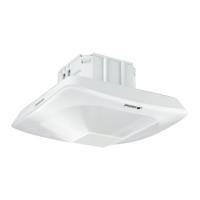
